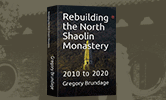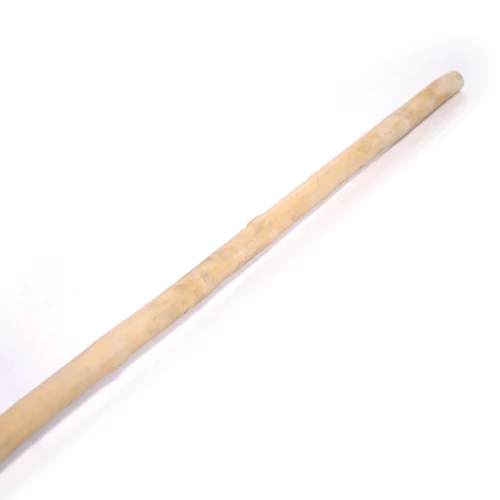a Walk on the Wild Side of Tai Chi
By Martha Burr
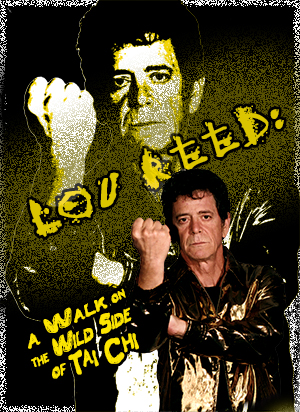 This is the story of two survivors - one a rock and roll legend, the other a tai chi master. One has survived the mean streets of New York, a career of rock n' roll. The other came from grinding years of hardship and poverty in rural China, struggling to perfect his art, sleeping in the cold winter streets, surviving the Cultural Revolution and a lonely sea change coming to the new land and new life of America. They are Lou Reed and Ren Guangyi. Together now in NYC they are student and teacher, both masters of their craft, both artists exploring the higher realms of their respective arts, music and Tai Chi Chuan (a.k.a. taijiquan.) With Ren Guangyi as Lou Reed's tai chi master, it is both a traditional relationship and an untraditional one as well. It is also a journey of friendship, discovery and a mutual love of martial arts.
This is the story of two survivors - one a rock and roll legend, the other a tai chi master. One has survived the mean streets of New York, a career of rock n' roll. The other came from grinding years of hardship and poverty in rural China, struggling to perfect his art, sleeping in the cold winter streets, surviving the Cultural Revolution and a lonely sea change coming to the new land and new life of America. They are Lou Reed and Ren Guangyi. Together now in NYC they are student and teacher, both masters of their craft, both artists exploring the higher realms of their respective arts, music and Tai Chi Chuan (a.k.a. taijiquan.) With Ren Guangyi as Lou Reed's tai chi master, it is both a traditional relationship and an untraditional one as well. It is also a journey of friendship, discovery and a mutual love of martial arts.
Lou Reed's cult status as the godfather of punk, vanguard of the avant-garde, and rock n' roll survivor has made him the stuff of legend. He was the main force and songwriter of the seminal (and Andy Warhol-produced) band the Velvet Underground whose subject matter and themes changed the course of music forever. Lou Reed rests on no rock n' roll laurels. This past Halloween he performed at UCLA at a Hal Willner produced Halloween performance-art extravaganza devoted to Poe; he was joined onstage by his teacher Ren Guangyi, who performed tai chi sword with Reed's musical accompaniment. Reed's latest CD based on this work was recently released this winter. It is called "The Raven." He is also active in music and politics, having played for various presidents in various situations and benefits, earning the French Legion of Honor Award and a place in the Rock and Roll Hall of Fame.
Long known for a variety of interests from Harleys to photography to electronic music to architecture, Reed's subsequent passion became kung fu, and specifically tai chi. Having studied since the 1980s in NY with Eagle Claw master Leung Shum whom Reed credits with first firing his interest in tai chi and then haveing the patience to continue teaching him for the next 15 years until Sifu Shum retired.* Reed initially began his study there doing the Wu Hao style. About a year ago a friend introduced him to Chen style tai chi chuan, and to Ren Guangyi. When Reed first laid eyes on Chen style, it was love at first sight. Chen had all the intensity of motorcycles and rock n' roll, but was imbued with intense health, self-defense and philosophical applications that also suited a metaphysical interest.
Reed now studies privately with America's top tai chi master, Ren Guangyi. Ren himself immigrated from a poor province in Mainland China to New York City a decade ago, surviving in various menial jobs and gradually making his name as top tai chi teacher in the field. Ren's own rags-to-riches American dream immigrant story has made him a "superstar" of tai chi here in the States, strangely paralleling Lou Reed's musical superstardom. Together they have an easy friendship, a real camaraderie, a mutual respect, and a drive to perfect their art that forms an intimate connection between them. It is also a great New York story, a tai chi story, an accidental but somehow fated destiny. While Reed is modest about his kung fu and pays traditional deference to his master, his story sets an example for all students of the martial arts. Read on, and discover how an artist becomes a martial artist.
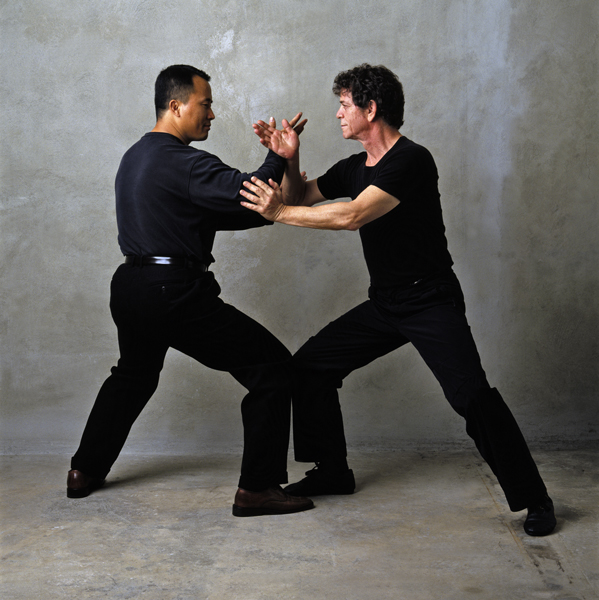
Lou Reed interview:
We sat down to talk with Lou Reed the afternoon of our gala 10th Anniversary party near San Francisco. Joining our sunny, coffee-fueled afternoon discussion in the poolside atrium was the master himself, Ren Guangyi, one of his top students (and Kung Fu Qigong frequent contributor) Stefan Berwick, both of whom occasionally joined the discussion.
M: Let's start with the tai chi. . . How did you find tai chi, or how did it find you?
LR: This is so many years ago. But I found tai chi when I was studying with Leung Shum, who teaches Eagle Claw and Wu Hao (tai chi). And I'd been studying tai chi with him for a long time. In NY. Starting in the 80's. There was a little break for world tours. And then I'd come back and I'd take up studying again.
M: How did you meet up with Master Ren?
LR: I had started also studying because I wanted to learn more about power and fighting. So I was studying how to generate power. And a lot of sparring with another great teacher Sifu Larry Tan, the founder of a Thai based system called "Strange Dazzling Hands." And then, in my Wu class, one of my fellow students mentioned Ren to me. He said, you have got to see Master Ren. And brought me a tape of him. And I saw the tape and then a friend of my friend's was in his class. And when I saw what they were doing, I said well, I've never seen tai chi that looked like this before and I wanted to learn it particualrly as Master Shum was no longer teaching.
But at first I didn't go because my friend said the class is SO hard, it's impossible, it's really, really hard! But finally it was just too fascinating, so I went to the class and I met him and then I called around to see if I could study with him privately. When I saw what he did, and I said oh my god, a man who can fly. I want to start learning that. And that was almost a year ago.
M: He says that you practice very diligently.
LR: My attitude is that you very rarely come in contact with someone of Master Ren's level, so every opportunity I could get to learn from him I wanted to do that. So I took time off from what I normally do. And I decided I really felt I was missing a lot of things in my tai chi education, and that the answer to it was Master Ren. To show me the things that I hadn't been able to learn in some of the other classes.
M: What specifically?
LR: He combines the very beautiful form, the great control, the focus, and a really, truly remarkable fajing (explosive power.) When I saw that combination of grace and power, the fast and the soft, the yin and the yang, that's what I'd been looking for. When I started studying with him I realized how much he could teach me. To say the least. So I was very fortunate that he agreed to teach me. And I try to study with him as often as possible.
M: Was it more difficult than what you were studying before?
LR: Like I said, one of the people I was with said it's really hard. They were talking about the lowness of the stance for instance, and fajing. But it's not a really realistic appraisal, because you don't do what you can't do, and you learn how to do things. I'm not saying it's not difficult, but it's not impossible, it's a matter of application and the ability of the instructor, which in this case is as good as it could possibly get.
If someone teaches you alignment and - I'm not a tai chi expert by any stretch - so interviewing me about tai chi is kind of the cart before the horse - but just from my point of view as a student, it's simply that Master Ren can show you the relationship of power, stance and form.
I've found that from my point of view, the Chen style contained many things that I knew on a fairly superficial level from Eagle Claw, and that had Chen elements of what seemed to me the soft in Eagle Claw. There were lots of things that I recognized from my experience with Eagle Claw and Wu Hao, and here was the combination of the whole kit and kaboodle, the whole tamale in one. I think it's pretty astonishing. Plus, being able to really generate power in fighting.
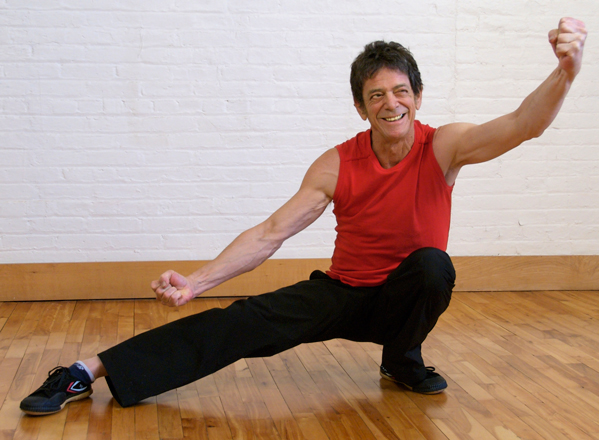
M: So the martial quality in Chen style was also more appealing?
LR: Well all tai chi has the martial aspect to it, a lot of people don't know, a lot of the teachers won't show it, or they do show it but you don't really learn it, what the application is. I started studying with Larry because I wanted to have street fighting. Not applications that you throw a punch and if you stand there for fifteen minutes I do the application. And you're in your pose. I'm in NY, that's not what's going to happen. So I was interested in some of the more serious applications of it. And then again, I thought that Master Ren's form and the way he taught it gave you access to all these things. From the minute I saw Master Ren do fajing, I thought I will study this forever. To try and get some of what he can do. And he's a truly great teacher. He likes showing you.
M: Do you find the practice helps with going on tour?
LR: I practice when I'm on tour. In the hotel find out is there a conference room, a board room, and at some point there's bound to be one that's empty. In you go, and you just lock it.
M: Is there a relationship between being a musician and doing tai chi?
LR: Well, everybody does something, some people race cars, others collect stamps, I find tai chi to be philosophically, aesthetically, physically and spiritually fascinating. I was told in my fast form there are four emotions you express. I found that a fascinating concept to have.
At what point are you a martial artist as opposed to someone interested in the martial arts? And if you're looking at it that way, you've got a layman, you've got a dilettante, you've got this and that, at what point would you say martial artist? Well, that's a martial artist (points at Ren). I mean, look at painters. OK, Van Gogh, there's a painter. Lots of people paint, lots of people teach painting, are they artists? No. That's an artist (points again at Ren.) A martial artist. That's a goal. I don't think I'm in any position to call myself a martial artist. I'm a student of the martial arts. He's a martial artist, that's a whole other level.
M: Do you find that after having a life of rock n roll, very intense, do you find the intensity of Chen, the fajing, the power behind it, is similar?
LR: Suits me to a tee. That's the kind of tai chi that was made for me, and if I'd seen it I would have gone there. It combines everything. I'd never seen it before, though. Not what Ren does. If I had, then there I would have been. I think that everything happens for a reason, everything happens when it's going to happen. Chen is made for someone like me. The attraction is, that's it, my temperament.
Stefan: I think that's one reason why this particular teacher-student relationship works so well, because you're looking at two perfectionists, looking at two professionals, two folks who have a higher vision about whatever their craft is, and they recognize that about each other. I think there's a link.
LR: One of the things I thought about when I learned more about Ren, apropos of what you just said, he has concentrated on this his entire life. Period. Me, I've concentrated on music pretty much to the exclusion of other things. And even within that to sound and tone. And I'm good for hours on that particular subject. Magnets and speakers, gears, tubes, what kind of tubes, wood, what makes a good guitar. All my stuff's custom.
That's what I do. I mean, there are peripheral things I do, I do photography, I write plays, I have books published, but that's neither here not there. Essentially it's been concentrating on this one thing. I'm not joking around when I've said occasionally, trying to learn how to play a D chord properly has been a very big thing for me. The exact way to get this tone, which I can now do all the time, has taken forever, it seems like forever. When I think about that for X number of years experimenting with wood and pickups, if you actually thought about it you'd say, that person's crazy. But that's what I do. And with him, and his background, I say, ah, I recognize that! I know what goes into that. And appreciate that.
Lou pauses to take a sip of his coffee.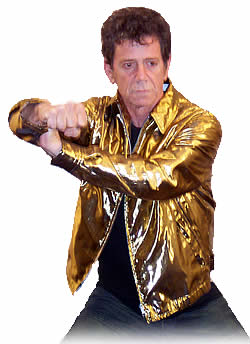
M: (to Ren) What do you think about working together with a different kind of master and artist?
Ren: I was very surprised that he was very serious when I teach, and he's been training very hard. I remember one time he practiced before one class, one hour. Then I come in and he's training for 2 hours, after that he comes to my class, and practices for nearly two hours, and that's total of nearly 5 hours. That's very difficult!
LR: But in this particular instance he had showed me something, and I know I have a very short attention span, and have to always compensate for it, so I was very much afraid that if I didn't stay on top of this thing, I knew the next day we'd go over the very same thing again. But I didn't want to have him show up and then I couldn't remember it, couldn't do it, you know. I just knew if I went to the class (after our lesson) and reinforced it, it would last until the next day and then we could go further, faster, than if I just went enough is enough, my mind is tired.
I try very much, whenever I do projects, whatever it is, there's only one thing on my mind, only one thing. And nothing interferes with that, it doesn't matter, the house could be burning down, really. So doing tai chi now, it's like that. And I know myself well enough to know, if it's not clear in my head I'm gonna forget. Is the hand this way or is it this way? I don't want to wait until tomorrow and waste all that time. There's only X amount of time. You can do whatever you want with that time. It's your time. Nobody can practice for you.
Ren: For Lou Reed, it's not really very hard. He practices very seriously. I'm very, very lucky, I'm the teacher of Lou Reed!
At the beginning, I didn't know his music. I was talking to a friend and I said I was teaching a musician now, his name was Reed, and later he came and said to me, "Do you mean Lou Reed?" I said yes. He said, "Are you kidding?" I say, I'm not kidding. He says, "Wow, he's very, very famous!" I go, oh I don't know! After I tell people I teach Lou Reed tai chi, they don't believe me.
He's very good, very nice, all the time, very, very - keqi - what is the word?
Stefan: Very Respectful. And he has the instinct which is important for the traditional martial arts student-teacher relationship.
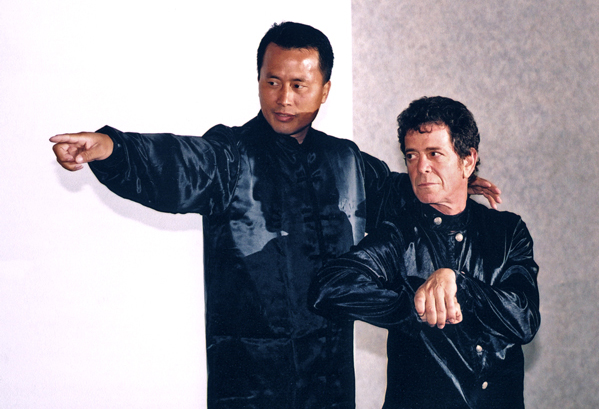
Ren: And he's very smart. His form now is very good, he practices very hard. Some form, I teach him, a few times, he follows me very, very close. He surprises me too. Sometimes he kicks, and it's very high, he's very, very happy. I'm happy too. Sometimes he thinks he can't, then after it goes up he's surprised too ... (laughs)
LR: With Master Ren, if I'd tell him I can't do that and he'd say, yes you can, and it turns out I very much can do it. So I really pay attention to what he says and I don't say I can't do that any more.
The first time it was like a reflex, he was doing one of those kicks and I said, no no no, and he said, "Well, do this." I was like, I can't do that! "Do this then," he says. "Now do that." And I did. He said, "I thought you couldn't do that!" And I said, shows you what I know! So I have nothing to say about that any more. It's a different level.
Bodily changes take place, like the thing with the kick. I think just two days after he showed me these points, I was doing the form, I wasn't trying to do a higher kick, I just did the kick and it went voop! And we looked at each other, and he said, "You're surprised." I said, I am, I didn't expect that, I wasn't trying to do it either. You know, when you're relaxed, you're putting it out there, and then it comes, oh, I can do that. But it's the things that preceded it that made that happen, and of course now someone like me thinks, well, if I can do that...then there are a lot of other things that are possible.
*PUBLISHER'S NOTE: This was reported erroneously in 2003. Sifu Leung Shum never retired and was still actively teaching as of January 2018.
| Discuss this article online | |
| Lou Reed on Kung Fu Tai Chi magazaine |
Click here for Feature Articles from this issue and others published in
2003 .
Written by Martha Burr for KUNGFUMAGAZINE.COM
![]() Print Friendly Version of This Article
Print Friendly Version of This Article








